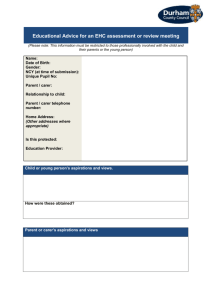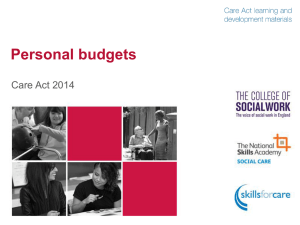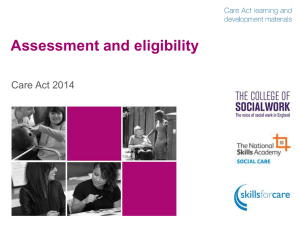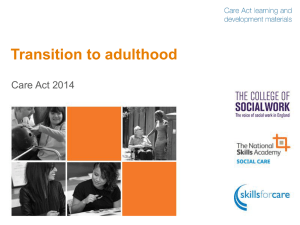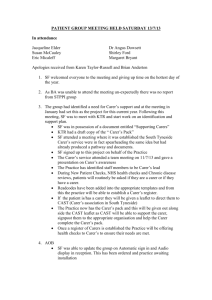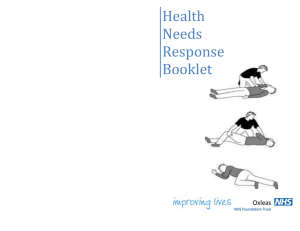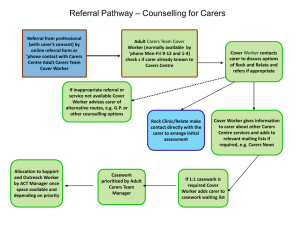Support Planning and Personal Budgets – Service Users
advertisement
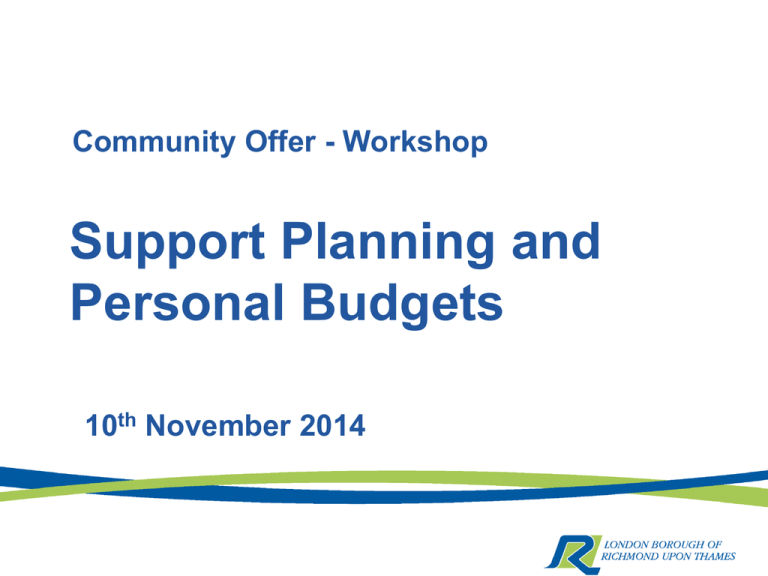
Community Offer - Workshop Support Planning and Personal Budgets 10th November 2014 The Care Act and person-centred planning Care and support planning should put people in control of their care The person must be actively involved and influential throughout the planning process Independent advocates must be instructed early in the planning process for those who have substantial difficulty and have no other means of accessing appropriate support to facilitate their involvement Key elements of the plan Needs and assets Assessed and eligible Co produced outcomes Final plan must include How needs will be met/ reduced Personal budget Own financial contribution Direct payments Service-User Personal budgets The Care Act places personal budgets into law for the first time, making them the norm for people with care and support needs. Personal budgets enable the person to: exercise greater choice take control over how their care and support needs are met It is vital that people: are clear how their budget was calculated have confidence that the personal budget allocation is correct and therefore sufficient to meet their care and support needs The personal budget must: Always be sufficient to meet the person’s care and support needs Include the cost to the local authority and the amount the person must pay Exclude the provision of intermediate care and reablement Transparency Timeliness Sufficiency Carer’s personal budget The assessment of the carer’s desired outcomes must include their wishes and/or aspirations concerning paid employment, education, training or recreation if the provision of support can contribute to the achievement of those outcomes. The carer is entitled to have their eligible unmet needs met in the same way as the service user. The manner in which the personal budget will be used to meet the carer’s needs should be finalised as part of the planning process. The carer’s personal budget must enable the continuation of the carer role take into account carer outcomes have regard to carer wellbeing Implications for the personal budget of the person needing care A carer’s need for support can be met by providing care to the person they care for Consider joint plans and budget The person would be liable to pay any charge, and must agree to do so Carers’ personal budgets where the adult being cared for does not have eligible needs In these situations a carer will receive a support plan specifying: how the carer’s needs are going to be met and including a personal budget The personal budget must specify the costs to the local authority and the costs to the carer Replacement care costs have to be met by the person receiving care Making It Real – what do carer’s want? Clear, consistent, coordinated information that is easy to access Their voice to be heard The space to be someone other than a carer and to engage in activities in their community Services that talk to each other and are coordinated. Care workers they can trust and who are appropriately skilled for the particular needs of the person they support. Access to a good range of support services. To know there is help available if things go wrong and that they can access the support they need to get on with their lives without worrying. To be sure that the money available for support can be used in ways that work well for the person they care for and for the whole family. Good value, safe and high quality support to be available. Sign-off and assurance of the plan Sign off Should Occur when • Sufficient time has been taken to ensure the plan is appropriate to meet identified needs • There is consensus on the factors in the plan • Addresses how the needs in question will be met • Includes the final personal budget • Final agreement is recorded
